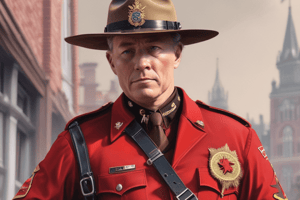Podcast
Questions and Answers
What trait influences a follower's ability to be led?
What trait influences a follower's ability to be led?
- Self-absorption
- Respect for authority (correct)
- Indifference to social structures
- Skepticism towards authority
People who ignore authority figures are more likely to be manipulated.
People who ignore authority figures are more likely to be manipulated.
False (B)
Name one reason for the decline of trust in leaders.
Name one reason for the decline of trust in leaders.
Breakdown of the traditional family structure
A lack of _____ and sense of community can lead to employees withholding trust.
A lack of _____ and sense of community can lead to employees withholding trust.
Match the reasons for the decline of trust in leaders with their descriptions:
Match the reasons for the decline of trust in leaders with their descriptions:
Which generation is likely to have different expectations regarding authority?
Which generation is likely to have different expectations regarding authority?
Trusting individuals are often reluctant to follow authority figures.
Trusting individuals are often reluctant to follow authority figures.
What personality traits are assessed by the Short Dark Triad (SD3)?
What personality traits are assessed by the Short Dark Triad (SD3)?
Which of the following is NOT a characteristic of the True Self?
Which of the following is NOT a characteristic of the True Self?
Leaders with traits of psychopathology typically exhibit high levels of remorse and guilt.
Leaders with traits of psychopathology typically exhibit high levels of remorse and guilt.
What is a key process in building self leadership?
What is a key process in building self leadership?
The three components of the Dark Triad include Machiavellianism, narcissism, and ______.
The three components of the Dark Triad include Machiavellianism, narcissism, and ______.
The statement 'It’s wise to keep track of information that you can use against people later' reflects which Dark Triad trait?
The statement 'It’s wise to keep track of information that you can use against people later' reflects which Dark Triad trait?
Match the following traits with their corresponding descriptions in the context of leadership:
Match the following traits with their corresponding descriptions in the context of leadership:
Self leadership is influenced by a set of core beliefs about oneself, the universe, and the Creator.
Self leadership is influenced by a set of core beliefs about oneself, the universe, and the Creator.
Identify a common behavior exhibited by followers of leaders who lack self leadership.
Identify a common behavior exhibited by followers of leaders who lack self leadership.
Which statement reflects a characteristic related to the Dark Triad personality traits?
Which statement reflects a characteristic related to the Dark Triad personality traits?
Individuals with Dark Triad traits often see themselves as natural leaders.
Individuals with Dark Triad traits often see themselves as natural leaders.
What scale is used to assess agreement with various statements regarding personality traits?
What scale is used to assess agreement with various statements regarding personality traits?
People who mess with me always _____ it.
People who mess with me always _____ it.
Match the following statements to their associated personality traits:
Match the following statements to their associated personality traits:
Which of the following best describes a common behavior of individuals high in narcissism?
Which of the following best describes a common behavior of individuals high in narcissism?
People who exhibit Dark Triad traits always display criminal behavior.
People who exhibit Dark Triad traits always display criminal behavior.
List one statement indicating low self-esteem from the provided content.
List one statement indicating low self-esteem from the provided content.
Flashcards
Respectful Followers
Respectful Followers
Individuals prone to following directions from authority figures without question and readily trusting others.
Distrustful Followers
Distrustful Followers
Individuals who are hesitant to place faith in leaders due to past negative experiences or a general skepticism.
Decline of Trust in Leaders
Decline of Trust in Leaders
The erosion of confidence in leadership, often stemming from past mistakes or perceived self-serving actions.
Erosion of Social Structures
Erosion of Social Structures
Signup and view all the flashcards
Lack of Shared Values
Lack of Shared Values
Signup and view all the flashcards
Leaders' Self-Serving Actions
Leaders' Self-Serving Actions
Signup and view all the flashcards
Evolving Expectations
Evolving Expectations
Signup and view all the flashcards
Leadership Process
Leadership Process
Signup and view all the flashcards
Psychopathic Leaders
Psychopathic Leaders
Signup and view all the flashcards
Self-Leadership
Self-Leadership
Signup and view all the flashcards
Core Beliefs
Core Beliefs
Signup and view all the flashcards
Thought and Emotion Regulation
Thought and Emotion Regulation
Signup and view all the flashcards
Leading Others
Leading Others
Signup and view all the flashcards
Dark Triad Traits
Dark Triad Traits
Signup and view all the flashcards
Short Dark Triad (SD3)
Short Dark Triad (SD3)
Signup and view all the flashcards
Emotional Intelligence
Emotional Intelligence
Signup and view all the flashcards
Dark Triad
Dark Triad
Signup and view all the flashcards
Narcissism
Narcissism
Signup and view all the flashcards
Machiavellianism
Machiavellianism
Signup and view all the flashcards
Psychopathy
Psychopathy
Signup and view all the flashcards
Dark Personality Traits
Dark Personality Traits
Signup and view all the flashcards
Agreement Level
Agreement Level
Signup and view all the flashcards
1-5 Agreement Scale
1-5 Agreement Scale
Signup and view all the flashcards
Study Notes
Leadership & Motivation
- HROB 711 - Lecture 3, Dr. Menatallah Darrag
Leadership Qualities
-
Chapter 3
-
Introduction: Leaders possess ten key qualities to a high degree, enabling them to influence the leadership process.
-
Qualities: Vision, Ability, Enthusiasm, Stability, Concern for Others, Self-Confidence, Persistence, Vitality, Charisma, and Integrity
Leadership Qualities: Self-Confidence
- Gives inner strength to overcome difficult tasks
- Leaders lacking self-confidence lead to disobedience from followers
- Leaders should stay calm and confident during challenging situations
- Grace under pressure inspires others
- Confidence builds with preparation and dedication
- Showing anxiety/yelling shows insecurity
Leadership Qualities: Persistence
- Persistence is the determination to complete tasks
- Drive and determination are vital in all aspects of life (personal, business, national)
- Leaders must believe, be persistent, and overcome obstacles.
- Examples include figures like Winston Churchill
Leadership Qualities: Vitality
- Leadership requires strength and stamina.
- Effective leaders are electric, vigorous, and full of life regardless of age or disability
- Leaders need stamina, energy, health, and vigor.
- Caring leaders must maintain health and vigor to achieve goals
- Physical checkups, and physical fitness are vital
Leadership Qualities: Charisma
- A special personal quality generating interest and creating followers
- Charismatic leaders show optimism, adventure, and commitment to their cause
- Napoleon identified great leaders as optimists and merchants of hope, inspiring energy in their followers
- Charisma fosters admiration and enthusiasm
- Leadership traits that promote follower loyalty and performance gains
Leadership Qualities: Integrity
- The most important leadership quality.
- Restores honesty, strength of character, and courage
- Crucial for creating and fostering trust within leader-follower relationships
- Builds respect, loyalty, and positive action from followers
- Leadership that reflects truth, personal values, and trustworthiness is key
Leadership Qualities: The Dark Side
- Barbara Kellerman - Dimensions/Behaviors of Ineffective Leaders
- Incompetence, Rigidity, Lack of Self-control, Callousness, Corruption, and Cruelty
- Morgan McCall & Michael Lombardo - Dimensions/Behaviors of Derailed Leaders
- Bully, Cold, Aloof, Arrogant, Betrayal of trust, Self-centered, problems in performance, over-management, and inability to delegate
Derailment Patterns
- Derailed leaders exhibit behavioral patterns not seen in successful leaders. This includes failure to meet performance objectives, inability to build and lead a team, failure to build positive relationships with co-workers, adapting to changing settings (bosses/followers), and inadequate preparation for promotions.
Negative Behaviors of Leaders (Dark Triad)
- Narcissism: A feeling of self-centered superiority and obsession with personal glory. Characterized by grandiosity, pride, egotism, and lack of empathy. Three signs: Boasting, seeking attention, and blaming others for failures.
- Machiavellianism: Characterized by manipulation and exploitation of others, lack of morality, unemotional callousness, and a high level of self-interest. Coping strategies: keeping track of behaviors, learning emotional regulation, seeking professional help, setting boundaries, and avoiding the sharing of personal details.
- Psychopathy: Characterized by antisocial behavior, impulsivity, selfishness, callous traits, unemotional nature, and lacking remorse.
Self-Leadership
- Self-leadership teaches followers to be led by their True Self.
- Key characteristics include calm, confidence, curiosity, courage, compassion, clear thinking, and creativity.
- Observing and regulating thoughts/emotions is vital for effective self-leadership.
- Effective internal self-leadership makes leading others easier.
Questionnaire Examples (1-5 scale of agreement)
- Examples are given with statements about their opinions on how certain leaders behave.
Characteristics of Followers & Situational Factors
- Followers influence the leadership process through respect for authority and interpersonal trust
- Reasons for employees witholding trust: decline of traditional family structure, decline of other social structures, lack of shared values/community, and leaders who place self-interest over the good of the public
- Followers' attitudes toward authority are changing and require leaders to adjust their expectations to their followers
- Employees develop defenses (organized unions, advocating for legislature) as ways to avoid being oppressed or mistreated
- Today's effective leaders avoid use of power-tactics (threatening employees and self-interest over community) and instead focus on motivating employees, facilitating, earning and protecting trust and respect.
- Stuart Levine and Michael Crom outlined principles of trust for effective leadership, focusing on openness, consideration of varying perspectives, keeping promises, and understanding followers' needs.
Interpersonal Trust Scale
- Shows the tendency to trust others
- High scores = more trust and susceptible to suggestions
- Low scores = less trust and tendency towards manipulation.
Situational Factors
- Organization size, social/psychological climate, type/place/purpose of work, and employment patterns affect leadership.
- Large organizations often focus on public image and investment, while smaller ones focus on individuals (sales/production).
- Social & psychological climate factors include confusion, anxiety, despair, and societal issues (pre-WWII Germany: great depression, unemployment & lack of resources).
Type, Place, & Purpose of Work
- Work duties (clear-cut, routine, or loosely defined, directive, task-oriented)
- Context of place (farm, factory, etc.), and purpose (production, sales)
Different Kinds of Intelligence
-
Crystallized Intelligence: accumulated lifetime intellectual achievements (vocabulary, facts, solving problems) which increases over time
-
Fluid Intelligence: mental flexibility, rapidly processing information (solving problems in new areas, reasoning, creativity). Decreases with age (especially after mid-80s).
Styles of Leading (1 and 2)
- Leader-follower compatibility is based on leadership style
- Directive, Participative, and Free-Rein styles are described by levels of authority/freedom for followers.
- People develop preferred styles through modeling, training and experience.
- Leaders need to shift their style based on the needs of their followers.
Styles of Leading (3)
- If leadership and following styles conflict, patience and communication are needed for successful decision-making, goal setting, and productive communication.
- Directive leaders might oppose free-rein followers who behave independently.
- Directive followers might oppose free-rein leaders and the lack of details.
- Participative followers might oppose leaders who fail to communicate effectively or do not acknowledge their concerns.
Table 3.1: The Changing Character of Work Culture and Changing Focus of Effective Leadership
-
Shows the differences in leadership style and work culture over various decades (Pre-1950 to Post-2000).
-
Different time periods emphasize various things (ex: strategy/innovation in the 1970s and 1980s, and diversity/community in the 1990s and 2000s).
Leadership Effectiveness Today
- No single perfect formula for leadership success: it is more of an art/skill
- Effective leaders need to be good directors, motivators, implementers, innovators, mentors, team builders, experts and developers of people
- Quotes (Harry Truman) from the slide on Leadership
Leadership Demands and Duties
- Shows the difference between traditional and new demands for leadership - Examples include giving orders vs. empowering people
What type of Follower are you?
- These are questionnaires for determining leadership styles.
HBR Reading
- Question prompts are presented to followers and reflect their needs.*
Studying That Suits You
Use AI to generate personalized quizzes and flashcards to suit your learning preferences.




